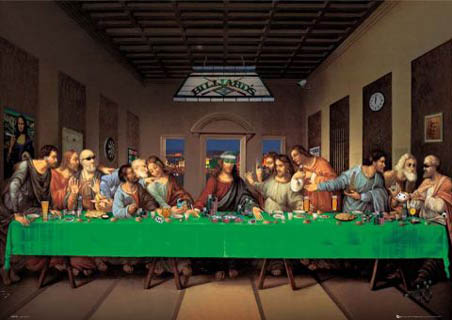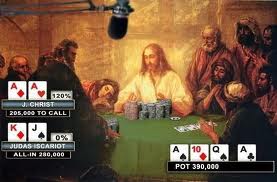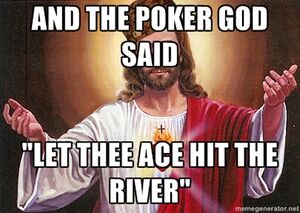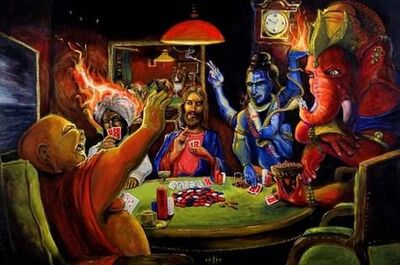The Last Poker
“Luck, be a lady tonight!”
“From my lips to Your cheek, I'll second that!”

The Last Poker (also known as the "Last Poker Tournament" or "The Lord's Poker") was a card night held by Jesus of Nazareth and his twelve foremost Disciples at the House of the Rising Sun in Jerusalem the day before the Last Supper (just after which Jesus was crucified). The Last Poker thus marked the end of a little-known gaming tradition developed by Jesus during the years of His ministry throughout Judea. Between 30 A.D. and 33 A.D., while wandering between towns spreading the Good News of everlasting life, Jesus realized that it was no easy task to save adulteresses from being stoned to death or to feed thousands of people with just a few loaves of bread and some tiny fish. Jesus thus started using weekly, low-stakes Poker games every Wednesday night to help Himself and His 12 Apostles regain their strength; in the words of the Lamb of God: "Man cannot live by bread alone; he needs a good game of cards every now and then, too." (Harrah's 12:44.)
The devotion that Christ paid to Poker attracted many people of faith but made enemies of certain power-brokers who saw Jesus as a threatening, political radical. During His Sermon on the Monte Carlo, Jesus preached from the casino rooftop that, "the winning Poker hand is mightier than the sword!" (MacGyver 49:92.) Jewish and Roman leaders began to see Christ as a deified proponent of violent revolution. They were wrong, but there was a grain of truth under their worries. Christ's dedication to Poker, His love for humanity, and His heralded reign over the Kingdom of God in the world to come were an astounding combination. Jesus quickly earned the title, "King of Hearts, and King of Kings" amongst his followers. On the night of The Last Poker, Apostle Judas Iscariot, Roman mobster Pokerus Pirate, and a group of Jewish elders finally reacted to Christ's rising popularity and influence by conspiring to arrest Him on trumped-up Poker charges and ban Him from playing Poker for the rest of His life.
The Last Poker had a lasting impact both on modern-day Poker and on Christianity. It was that very night that Jesus handed down his Ten Commandments of Poker, many of which remain basic Poker etiquette to this day (i.e., "Thou Shalt Not Splash the Pot," and "Thou Shalt Not Bet Out of Turn"). The Last Poker also presaged Christ's impending betrayal by Judas Iscariot when Judas won a pot worth 30 pieces of silver by dealing Jesus the first-ever "Dead Man's Hand" from the bottom of the deck. Finally, it was during The Last Poker that Jesus taught His followers how to play the card game known today as "Euchre", which Jesus requested the Apostles play in remembrance of Him.
Events Leading Up to The Last Poker
Jesus Founds His Weekly Poker Night and Makes His Triumphal Entry into Jerusalem

Early in His ministry, in approximately 31 A.D., Jesus realized he was wearing out His Apostles. They became tired and demoralized constantly roaming in pairs from from Galilee to Antioch and beyond, carrying only a staff. Jesus therefore taught the Apostles the ways of Poker along with peace, humility and eternal salvation. Soon, Saint Peter was telling Jewish villagers that it is easier for a fat man to pass through the eye of a needle than to draw an inside Straight. Similarly, John the the Baptist became known for baptizing new converts in the River Jordan while preaching the importance of the "river" card when betting during Poker. Even Jesus worked Poker into his ministry; he spread the Word of the Lord during his frequent entries into Poker tournaments, telling other players, "Don't count your money while you're sitting at the table; there'll be time enough for counting on Judgment Day when the dealing's done."[1] (Kenneth Rogers 14:35.)
Of course, Christ's ministry did not last forever. Biblical scholars agree that the end of Christ's ministry is marked by His entry into ancient Judea's capital, Jerusalem, for Passover in the week prior to His crucifixion by Pontius Pilate and the Roman war machine. Most scholars, however, are unaware of how Poker and gambling influenced this critical time in the life of Christ.
Cleansing of the Temple: Confrontation with the Poker Dealers and Money Changers
Upon arriving in Jerusalem on the Tuesday before Passover, Jesus headed to Herod's great Jewish Temple. Once inside, Jesus was shocked to find pilgrim worshipers gambling at Poker and Blackjack tables. As He watched players take their winnings and cash them out with the money changers, who would exchange the winners' Poker chips for silver coins, Jesus was filled with righteous indignation. "He ordered them all out of the temple, with their card decks and chips, and then poured out the changers’ money and overturned the Poker and Blackjack tables. And He said, 'Although it is written that My Father's house shall be called the house of prayer, ye have made it a den of card sharps and thieves.'" (Monte Carlo 21:12-18.) While this was happening, Judas overhead a Roman mobster warn a Temple Priest that "this Jesus fella's really cuttin' into our gaming operations - he needs to disappear. Capisce?" Judas kept quiet and left with the other Disciples to help Christ scout out a place to hold their weekly Poker night.
Selection of the House of the Rising Sun as the Location for the Last Poker
Jesus and His 12 Apostles left the Temple and returned to the outskirts of Jerusalem to avoid possible "misunderstandings" with King Herod's religious authorities and the Roman Mafia over the cleansing of the Temple. In the end, however, Jesus decided not to let the issue interfere with His weekly Poker night. He therefore waited until the final hour before sunrise the following morning, i.e., the Wednesday before Passover, and then instructed two of his Disciples to travel back into Jerusalem to locate the casino in which they would hold their Poker night later that day. When asked how they would know which casino to choose, Jesus informed the two Disciples as follows: "There is a house in Jerusalem they call the Rising Sun; it shall be the ruin of many a poor boy, and God, I know, I'm one. But anyways, to find it, follow the road until the sun rises, and the house shall be directly before you; this shall be where we will play Poker tonight, and you will find upstairs a private Poker room and table prepared especially for us." (Gambler's Anonymous 17:911.) The Disciples carefully followed Christ's instructions, found the casino, and then sent for Jesus and the rest of the 12 Apostles.
Details of The Last Poker
Judas Uses the Poker Deck to Elevate the Mark of the Beast (three Sixes) over the Son and the Father (the King of Hearts and the King of Diamonds)
"Of what is a man profited, if he shall gain the largest pot at the grandest Poker table in the whole world, and lose his own soul?" ——Jesus explaining the the folly of using sinful Poker techniques for earthly gain (Poker Wednesdays with Jesus: 34:20-25)
|
That night, Jesus and the 12 Apostles gathered at their private table in the House of the Rising Sun and began playing "dealer's choice" Poker just after sunset. When the dealing rotated to Judas, he called Five Card Draw as the game and dealt each player five cards, face down. Before even glancing at His cards, Jesus looked up at at each of the Disciples and gave a dire prediction: "Verily I say unto you, that one of you shall cheat me out of winning this hand." (Card Sharps 10:666.) And the Apostles were exceedingly sorrowful, and began to say unto Him every one, "Is it I, Lord?" (Card Sharps 10:669.) And Jesus answered and said, "He that dealt this hand to me, the same shall betray me." (Card Sharps 10:772.) The players proceeded to place their initial bets, discard and draw further cards as dealt by Judas, and then place their final bets. Jesus placed the last and highest bet and called the hand, showing His own hand in the process - Two Pair: the Ace of Clubs, the Ace of Spades, the Eight of Clubs, and the Eight of Spades. Each of the disciples other than Judas then showed their respective hands, none of which were higher than a single Pair. Finally, Judas placed his cards on the table face up to reveal a Full House: Sixes over Kings. Jesus then looked directly at Judas and said, "You have dealt from the bottom of the deck to give me a Dead Man's Hand and place the Mark of the Beast over the two True Kings, yet it is you who shall suffer; for the Son of man goeth, even as it is written of Him: but woe unto that man through whom the Son of man is betrayed! Good were it for that man if he had not been born, than to play Poker thus and die." (Card Sharps 10:711.) Judas remained silent, avoiding Christ's penetrating stare. It was then that Satan entered into Judas. Jesus therefore said unto him, "What thou doest, do quickly." (Card Sharps 10:1048303.) Judas scooped up the chips on the table and then, having taken the winning pot, went straightway from the Poker room screaming into the night.
Jesus Ends the Last Poker with His Farewell Discourse on Card Playing, and Reveals the Ten Commandments of Poker
With Judas gone, Jesus admonished His 11 remaining Apostles on Poker and card playing. First, he warned the remaining Apostles to avoid gambling with untrustworthy people in gaming houses of ill repute. Pointing out His recent betrayal by Judas in just such a place, Jesus told his followers, "Brothers, tell your followers not to do as I have done - to spend their last days in a place of sin and misery, like the House of the Rising Sun." (The Animals 13:45.)
Jesus then continued to expound on His betrayal by Judas and took time to explain to the other Apostles how His betrayal created a spiritual paradox that only He could resolve. "The fact that Judas sinned so grievously today and was still able to escape with his ill-gotten winnings is nothing new under the sun; as it is written: 'There be just men, unto whom life happeneth as if they hath done the work of the wicked; again, there be wicked men, to whom life happeneth as if they hath done the work of the righteous.' Yet while the sinful card sharp may reap a harvest of playing chips under the sun, he who cheats against the Son and the Father to win a hand jeopardizes eternal salvation. Of what is a man profited, if he shall gain the the largest pot at the grandest Poker table in the whole world, and lose his own soul?" (Poker Wednesdays with Jesus: 34:20-25.)
Notwithstanding the above, Jesus did not declare it to be a sin to play Poker. Rather, to "clean" the game up, Jesus pronounced the divinely-inspired Ten Commandments of Poker, as follows:
| No. | Poker Commandment |
|---|---|
| 1. | Thou Shalt Honor Thy Dealer as Thou Wouldst Thy Mother and Father |
| 2. | Thou Shalt Not Splash the Pot |
| 3. | Thou Shalt Not Bet Out of Turn |
| 4. | Thou Shalt Not Count Thy Money While Sitting at the Table |
| 5. | Thou Shalt Not Covet Thy Neighbor's Cards |
| 6. | Thou Shalt Not Bear Marked Cards or Deal the Cards Falsely |
| 7. | Thou Shalt Keep to Thy Weekly Poker Night |
| 8. | Thou Shalt Not Check and Raise |
| 9. | Thou Shalt Not Play Poker on the Sabbath or in the Temple |
| 10. | Thou Shalt Not Play Poker with Anyone Named Judas |
Jesus then explained that the Apostles should play a game other than Poker in His remembrance: Euchre. The card game is nothing like Poker, but it does impart Christian values such as cooperating with your neighbor (for instance, Euchre is most commonly played with four people in two partnerships). Also, some Biblical scholars argue that Jesus revealed the card game as a way of making an example of Judas: Euchre is responsible for introducing the Joker into playing decks. Jokers are by nature "wild cards" that add an element of unpredictible surprise to card games. Indeed, much like the Joker, Judas proved himself to be both a fool and a shifty "chameleon": in one moment, Judas appeared as one of Christ's most devoted and loyal followers; then, in the next moment, he turned into Christ's most treacherous and fallible Poker dealer.
Finally, having provided his Farewell Discourse and laid down the Ten Commandments of Poker, Jesus told the 11 remaining Apostles that there would be no further, weekly Poker nights in which Jesus would be participating. Before He could explain why, however, there was a loud pounding at the door to the private Poker room.
Jesus is Arrested, Tried, and Punished by the Pharisees and Casino Boss Pokerus Pirate
Judas Iscariot came through the Poker Room Door unannounced, walked up to Jesus, and handed him a King of Hearts. Jesus asked, "Is this how you betray me? With the one card that represents me as the King of Kings, with boundless love for all mankind regardless of their sins?" (Benedict Arnold 13:35.) Before anyone else could say or do anything, four muscle-bound pit bosses from the main gaming floor downstairs rushed into the room and seized Jesus. It quickly became obvious to the other Disciples that Judas had sold Jesus down the proverbial river to the Roman Mafia and Temple elders. Accordingly, when the pit bosses seized Jesus, one of His Disciples tried to aid Him by standing up and declaring, "If it is Jesus of Nazareth you seek, you have the wrong man. I am he who calls himself the King of Kings - come see the King of Hearts up my sleeve." (Kings 32:56.) Jesus raised his hand to silence his Disciple, admonishing him that, "He who lives by the bluff dies by the bluff." (Kings 32:89.) Jesus thus went peacefully downstairs with Judas and the pit bosses to the first floor of the House of the Rising Sun to face the accusations against Him.
"Render unto Caesar's Palace the Poker chips that belong to Caesar; render unto God the Poker chips that belong to God." ——Jesus reconciling Poker here on earth with the Poker of Kingdom Come (Pokerus Pirate 3:02)
|
The Manager of the casino, a Roman official and petty mobster named Pokerus Pirate, was waiting for Jesus along with several Pharisees and Rabbis from the Temple. Pokerus Pirate began interrogating Christ in classic "Good cop/Bad cop" fashion. He said to Jesus, "They tells me you break Jewish law by playing Poker using the Kings as the high cards, and Aces as the low cards." (Pokerus Pirate 25:35.) Jesus remained silent. Pokerus Pirate went on and asked, "Time to come clean: are you the King of Kings, the King of Hearts incarnate on Earth?" (Pokerus Pirate 25:35.) Jesus responded, "So you say." (Pokerus Pirate 25:35.) Pokerus Pilate then asked, "So, pal, you are a king?" (Pokerus Pirate 25:35.) Without even waiting to see how Jesus would answer, The Pharisees took on their "bad cop" roles and began yelling that Jesus must be punished for treason because Caesar was the only true king. They screamed for Jesus to suffer the penalty for betraying the Roman Empire: Death. Pokerus Pirate then played his proverbial Trump Card and told Jesus, "That's a nice fish symbol you have there on your robe.[2] You know, the river outside has fishes in it. If these Temple guys here get their way, you're gonna be sleepin' with them fishes at the bottom of the river. I'm pretty sure I can convince them to back off, but you're gonna have to 'fess up to being wrong about all this crazy Poker stuff and promise not to do it no more." (Pokerus Pirate 27:67.)
Jesus answered that His Poker table was not of this world and that the Poker of His Kingdom could have no bearing on the Poker of Rome or Judea. Pokerus Pirate became confused and then decided that Jesus was a just harmless card nut. To prove his point to the Pharisees, Pokerus Pirate asked Jesus one last question: "So what should I do to take care of this little problem we have?" It was then that Jesus responded with his famous pronouncement, "Render unto Caesar's Palace the Poker chips that belong to Caesar; render unto God the Poker chips that belong to God." (Pokerus Pirate 3:02.) Pokerus Pilate turned to the Pharisees and ruled that Christ bore no guilt. The Pharisees, who owned the House of the Rising Sun but did not manage it, still felt threatened by Christ and refused accept Pokerus Pirate's judgment. They agreed to let Jesus live but insisted He be publicly humiliated and banned for life from playing Poker. Judas felt a sudden and unbearable feeling of guilt as he heard Chirst's punishment announced and ran out of the casino screaming for the second time that night.
The Passion of the Christ (for Poker)
Thus began what is known as The Passion of the Christ (for Poker). The pit bosses in the House of the Rising Sun proceeded to superglue 666 Kings of Hearts all over Christ's face and body, and then hung a sign around His neck that fell over His chest with the Latin inscription I.N.R.C.C. ET R.R.[3] (i.e., "Jesus of Nazareth, King of Hearts and King of Kings"). (Bosses 25:12.) They also hung a second sign around His neck that fell over His back, which read, "Banned for Life from All Poker Games upon Pain of Being Drowned in the River." (Bosses 25:15.) They then threw Jesus out of the house and into the street. The remaining 11 Apostles followed and were all shocked to see Judas waiting there outside on his knees in the darkness, begging Christ for forgiveness and a second chance, "double or nothing." (Bosses 27:11.) Jesus absolved Judas of his sins and allowed him to rejoin the Apostles. From there, Jesus and the 12 Apostles wandered through the city looking for a place to spend Passover.
Conclusion
It is well known that Jesus went on to find a suitable location to hold a Passover dinner with his 12 Apostles, only to be betrayed by Judas (again) and persecuted by Jewish and Roman leaders (again). The second time was not a charm for the Savior, however, and after the Last Supper He went on to be crucified. Some say that Christ now plays Poker at the right hand of the Father in Heaven; others say Jesus plays in regular tournaments with deities from other religions. This said, there can be no doubt that the Last Poker played a critical part in the final days of Christ prior to His crucifixion, resurrection, and ascension into Heaven. And, of course, Poker and Euchre would not be what they are today if not for the Last Poker.
Reference(s)
- ↑ Christ's ministry went beyond instructing His flock in the ways of Poker; the card game "Go Fish" also featured prominently due to the number of fisherman amongst His Disciples.
- ↑ The symbol of the fish (along with the card game of “Go Fish”) were quick to become mainstays of Christianity. (See, fn. 1, supra.) It was during His Sermon on the Monte Carlo – held at least two years before Jesus cleansed Harod’s Temple of the Poker dealers and money changers – that Jesus first preached one of his most-quoted proverbs: "Give a man a fish and he eats for a day; teach a man to play high-stakes ‘Go Fish’ and he eats for life." (Bullshit Card Legends 5:76.) Historians agree the proverb was already in common use by the time Jesus made His triumphal entry into Jerusalem. Accordingly, secular historians and Biblical scholars are in virtually complete agreement that Pokerus Pirate did indeed notice a fish symbol on Christ’s robes during the night of The Last Poker.
- ↑ In full Latin, the inscription reads as follows: IESUS NAZARENVS REX PECTORVM PECTORIS ET REX REGVM
See also
| Featured version: 20 December 2012 | |
| This article has been featured on the main page. — You can vote for or nominate your favourite articles at Uncyclopedia:VFH. | |





